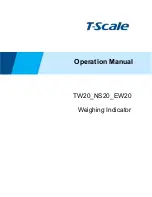
Hauser
21
Limit signal function (pages 30...41)
Limit signal outputs (
):
The switch positions may be different.
This also applies to CH2 (p. 30...33) and CH1 + CH2 (p. 34...37),
where CH2 acts on the two outputs CH2 and CH3.
Inputs (
):
With several inputs, the limit signals may be different for the individual channels,
e. g. H
for CH1, L for CH2;
Two-point regulation,
Δ
s 2 function (pages 42...49)
Limit signal outputs (
):
The switch positions for CH2 and CH3 may be different.
Inputs (
):
The limit signals for CH2 and CH3 must be identical:
H
for CH2 and H
for CH3 or L
for CH2 and L
for CH3;
Alarm signal
Choice between alarm signal ( ) and no alarm signal ( ) is only possible between
different input channels.
With alarm signal ( ):
When an alarm occurs at an input, the output relay and the alarm relay belonging to this
input drop out.
If no input is connected to a channel, switch off the alarm signal ( ).
Function description
The switch positions depicted in the Chapter “Function” on pages 30...49 have the effect
that the output relay drops out on receipt of a limit signal (H
or L
);
i. e. when a limit signal is present, the same contact position occurs as for a fault or mains
failure (= fitted for safety).
The switch positions and the input signals are depicted identically for all channels.
en -
Explanations of DIL switches
















































